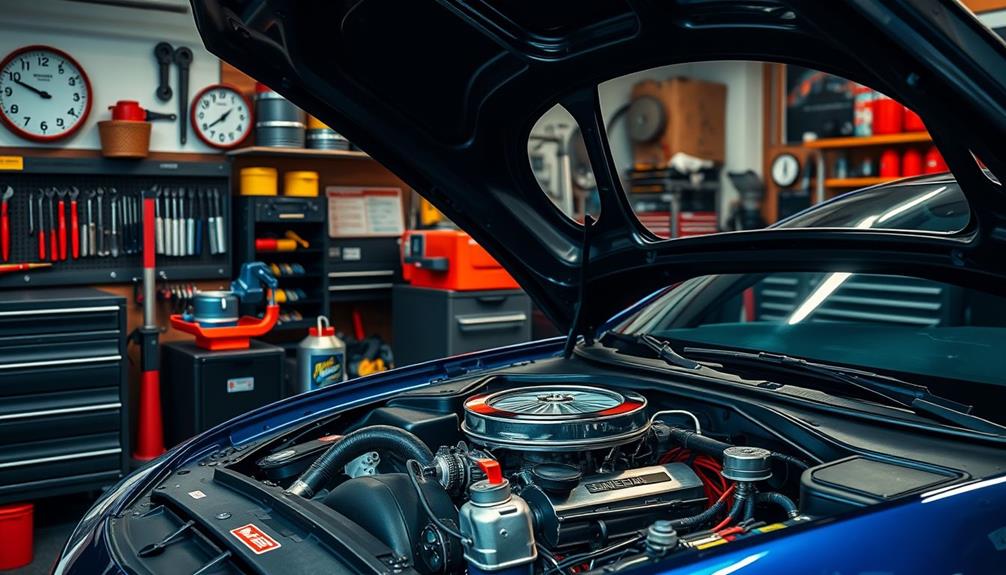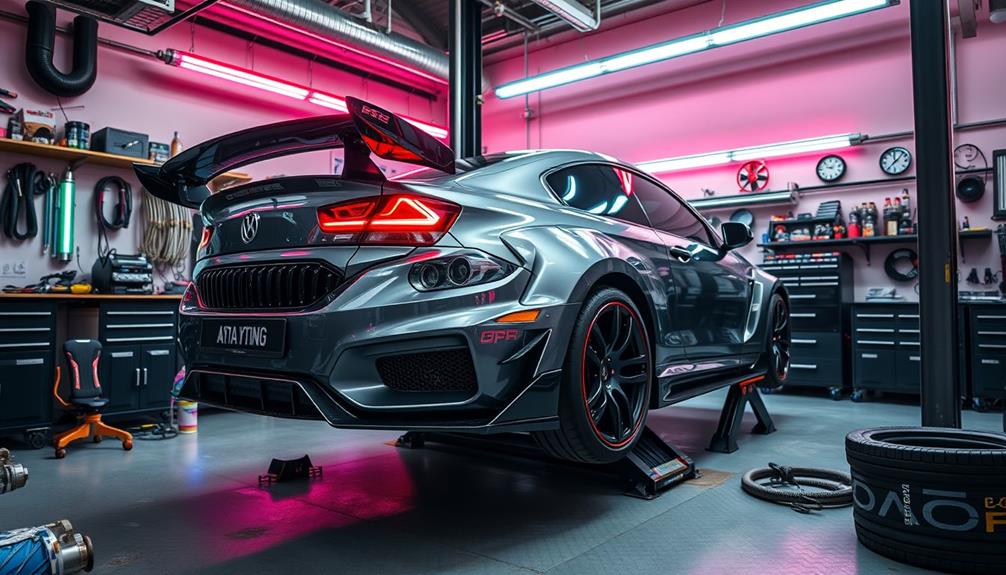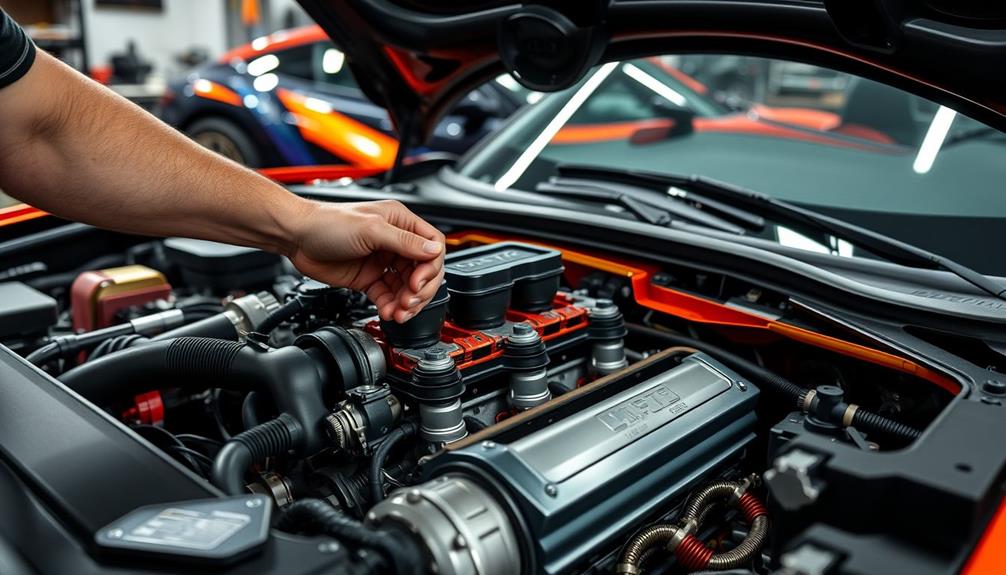Car tuning can absolutely be a job, blending your passion for automobiles with professional prospects. You'll start by gaining hands-on experience and refining your technical skills, perhaps by volunteering at tuning shops. Networking within local clubs can help you connect with industry experts and potential clients. While shifting from a hobbyist to a professional may seem overwhelming, continuous learning and gradual growth can guarantee you manage challenges effectively. By treating your interest seriously, you can establish a rewarding career in car tuning. If you're enthusiastic to explore the steps to make this shift, you'll find valuable insights ahead. Additionally, researching and understanding the average car tuning salary in your area can give you a realistic expectation of your potential earnings. Many car tuning professionals find that specializing in specific areas, such as performance tuning or aesthetic modifications, can help them command higher rates. By staying informed about industry trends and developing a strong client base, you can work towards a successful and lucrative career in the car tuning industry.
Key Takeaways
- Car tuning can be a viable career by combining passion with market demand and technical skills in the automotive industry.
- Gaining hands-on experience and education in EFI tuning enhances your qualifications and builds a professional network.
- Establishing a tuning business gradually while maintaining financial stability helps navigate early challenges and market saturation.
- Strong customer relationships and effective financial management are crucial for sustained success in the competitive tuning market.
- Continuous learning and networking within the automotive community foster growth and keep you updated on industry trends.
Career Transition Strategies
Moving into a career in car tuning can be exciting yet challenging. To make a smooth conversion, start by conducting thorough research on the automotive tuning industry. Understanding market demand and competitor analysis will help you craft a solid career strategy.
Next, gain hands-on experience by volunteering or working at local tuning shops. This not only hones your essential skills but also allows you to build a professional network within the industry. Connecting with experienced tuners can provide valuable insights and mentorship that'll benefit your career.
Don't overlook the importance of investing in educational resources. Courses and workshops focused on EFI tuning and automotive principles can enhance your technical knowledge and credibility, setting you apart in the competitive landscape.
If you're concerned about financial stability, consider starting your tuning business gradually. Offering your services on weekends while maintaining your current job can help you ease into this new career path without financial strain.
Lastly, join local tuning clubs and community events to stay updated on industry trends. These connections will support your growth and help you navigate your new career in car tuning effectively.
Developing Technical Skills

To thrive in the car tuning industry, developing technical skills is essential. You'll want to start by gaining hands-on experience with dyno systems, as this will deepen your understanding of tuning principles and help you refine your technical skills.
Enrolling in specialized courses tailored to both beginners and experienced tuners can provide a solid foundation in EFI tuning, which is critical for your career.
Don't underestimate the value of practical experience—participating in workshops or volunteering at tuning shops not only hones your skills but also allows you to connect with industry professionals.
Mastering various tuning techniques, such as standalone tuning and reflashing, is imperative for adapting to different vehicle requirements and enhancing your tuning capabilities.
Additionally, immerse yourself in continuous learning through technical literature and seek mentorship from seasoned tuners.
This proactive approach will greatly elevate your expertise in the dynamic automotive industry. By investing time and effort into developing your technical skills, you'll position yourself as a competent and competitive tuner ready to tackle the demands of this exciting field.
Networking Opportunities
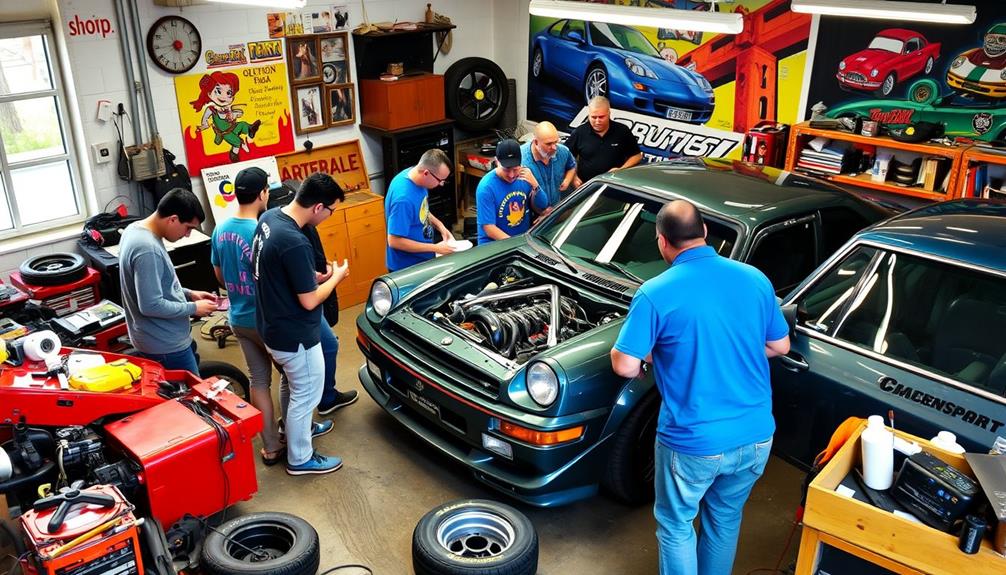
When it comes to advancing your career in car tuning, networking opportunities can be a game-changer. Connecting with local tuning clubs can introduce you to fellow enthusiasts and industry professionals who can offer invaluable guidance and support.
Attending automotive events like car shows and meets not only increases your visibility in the tuning community but also helps you build relationships with potential clients and collaborators.
Engaging with experienced tuners on social media platforms and forums can open doors to mentorship opportunities, enhancing your skills and knowledge in the industry. These connections can provide insights you mightn't find in books or online tutorials.
Renting dyno space at established tuning shops allows you to gain practical experience while networking with other tuners and experts in a collaborative environment.
Additionally, joining automotive associations or organizations can give you access to exclusive resources, training, and specialized networking events. These connections keep you informed about industry trends and opportunities, helping to elevate your career in car tuning.
Embrace these networking opportunities, and you'll find yourself well on your way to turning your passion into a successful profession.
Entrepreneurial Challenges
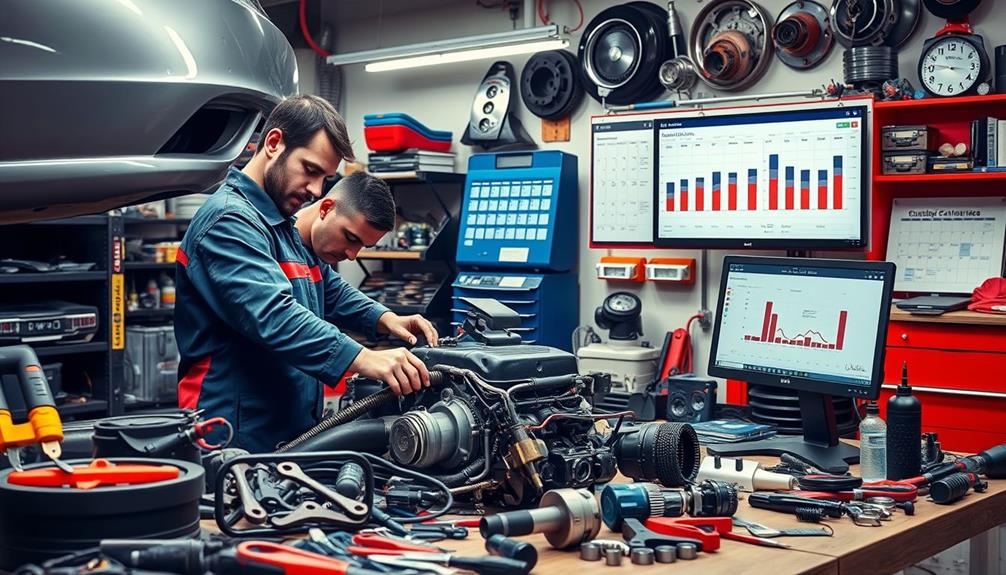
Starting a car tuning business means you'll face some tough entrepreneurial challenges.
Managing finances, staying aware of market saturation, and maintaining a healthy work-life balance can be overwhelming.
If you're not prepared, these hurdles can quickly turn your passion into stress.
Business Financial Management
Maneuvering the financial landscape of a car tuning business can be challenging, especially in the early stages when cash flow often stretches thin. To guarantee your venture thrives, effective financial planning is essential.
You need to grasp the administrative aspects, like operational costs and taxes, to minimize risks. Understanding the importance of a budget will help you allocate resources wisely and guarantee you have a clear view of your financial health.
Here are some key areas to focus on:
- Bookkeeping: Keep detailed records of income and expenses to maintain financial health.
- Customer Service: Cultivating strong relationships will help drive repeat business and referrals, vital in a competitive market.
- Insurance: Protect your business against unforeseen circumstances that could impact your finances.
Understanding these components won't only help you navigate compliance requirements but also prepare you for the challenges ahead.
As market saturation looms, having a solid foundation in financial management becomes essential. It's about making informed decisions that foster growth while maintaining a budget.
Market Saturation Awareness
Maneuvering market saturation is essential for anyone looking to thrive in the car tuning industry. You need to recognize that the automotive tuning market can be highly competitive, especially in areas where the number of tuners is high. Conducting thorough market research is vital to understanding local demand and competition. This research will help you identify customer preferences and gauge whether the market is saturated.
In cities like Melbourne, there's a strong demand for tuning services, but the limited number of established tuners creates a challenging landscape for newcomers. You must be aware of the barriers to entry, such as existing relationships between tuners and suppliers, which could hinder your ability to secure necessary resources.
Understanding these dynamics will allow you to carve out a niche or develop unique offerings that differentiate you from the competition. By acknowledging the risks of market saturation and preparing accordingly, you can position yourself for success in a crowded field.
Focusing on building your credibility and establishing a loyal customer base early on will be key to overcoming these entrepreneurial challenges.
Work-Life Balance Challenges
Balancing the demands of running a car tuning business with personal life can feel like a high-wire act. You're driven by your passion for cars, but the reality of customer service, financial pressures, and continuous learning can lead to overwhelming stress.
It's vital to find that work-life balance to prevent burnout.
Here are some challenges you might face:
- Time Management: Juggling hands-on tuning work with marketing and accounting can stretch your schedule thin.
- Client Satisfaction: Maintaining high standards in customer service is vital, but it can pull you away from personal time.
- Skill Development: Staying updated on industry trends requires constant learning, often consuming your free time.
To succeed, you'll need to prioritize tasks effectively and set boundaries.
Consider delegating certain responsibilities or scheduling regular breaks.
Remember, your passion for cars should fuel your work, not drain you.
Addressing these challenges head-on can help you maintain a healthier work-life balance, ensuring both your business and personal life thrive.
Understanding Administrative Tasks
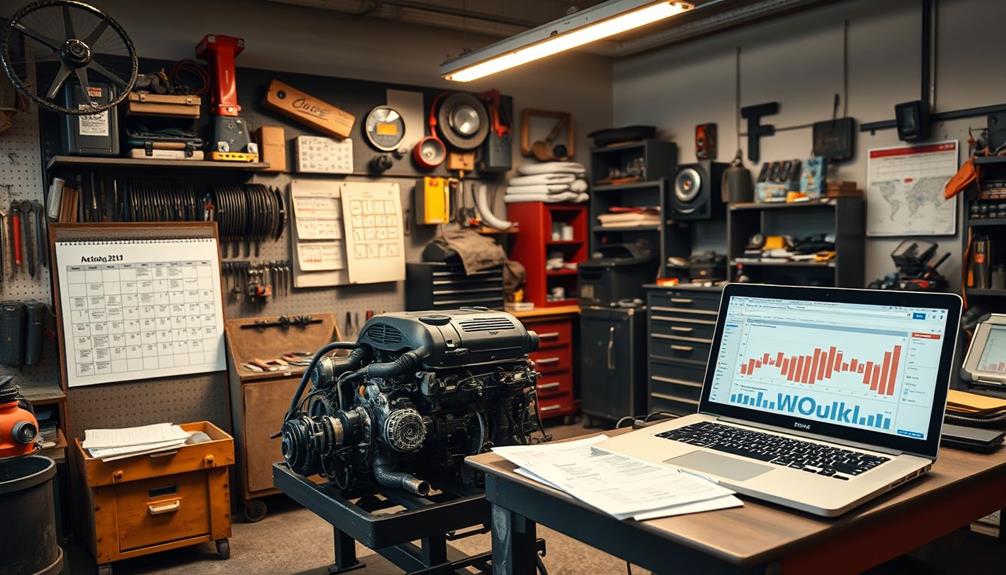
When you run a car tuning business, understanding administrative tasks is essential for success.
You'll need to manage financial aspects like taxes and insurance while ensuring compliance with local regulations.
Mastering these areas helps you avoid pitfalls and maintain a thriving operation.
Essential Administrative Knowledge
To successfully run a car tuning business, grasping essential administrative knowledge is key. You need to navigate various responsibilities to guarantee your business thrives and remains compliant with regulations.
Start by understanding insurance requirements; this protects you from potential liabilities and keeps you in line with local laws. Additionally, consider the role of effective business practices in managing your operational risks, as highlighted in cold medications overview.
Familiarize yourself with tax obligations and operational costs. This knowledge helps you build a sustainable financial plan and avoids those pesky unexpected expenses that can derail your progress.
Don't overlook zoning laws and noise ordinances, either. Knowing these regulations is essential to prevent legal issues, especially if your shop is in a residential area.
Effective accounting practices also play a significant role in your business. You should track your income, expenses, and overall financial health to make informed decisions.
Here are a few key areas to focus on:
- Insurance requirements: Protect your business and comply with regulations.
- Tax obligations: Build a sustainable financial plan.
- Zoning laws: Avoid legal complications in residential areas.
Financial Management Practices
Understanding financial management practices is fundamental for running a successful car tuning business, as it lays the foundation for sustainability and growth.
You'll need to maintain accurate financial records, tracking your income, expenses, and profits to guarantee your business remains financially healthy. This overview will help you make informed decisions.
Familiarity with insurance requirements is significant. It protects you against potential liabilities and guarantees compliance with industry regulations. Without the right coverage, you risk facing significant financial setbacks.
Knowledge of tax obligations is also imperative. Understanding what you owe allows for accurate reporting and helps you avoid penalties from tax authorities.
Implementing effective bookkeeping practices will enable you to track operational costs, which is fundamental for budgeting and planning future investments.
Regularly reviewing these costs can identify areas for improvement and streamline your operations.
Regulatory Compliance Requirements
Regulatory compliance is essential for running a successful car tuning business, as it guarantees you meet local laws and industry standards. Failing to adhere to these regulations can result in costly shutdowns, fines, or legal issues.
Here are some key areas to focus on:
- Business Licenses: Make sure you obtain the necessary licenses and permits specific to your location and services offered. This step is vital for legal operation.
- Insurance Coverage: Protect your business by securing liability and property insurance. This coverage safeguards you from potential lawsuits and damages that could arise during tuning operations.
- Noise Ordinances: Familiarize yourself with local noise ordinances to avoid complaints from neighbors. Excessive noise can lead to significant legal troubles and affect your business reputation.
Additionally, don't overlook environmental regulations regarding emissions and waste disposal. Compliance in these areas is critical for avoiding penalties and maintaining sustainable practices in the tuning industry.
Passion Vs. Profession
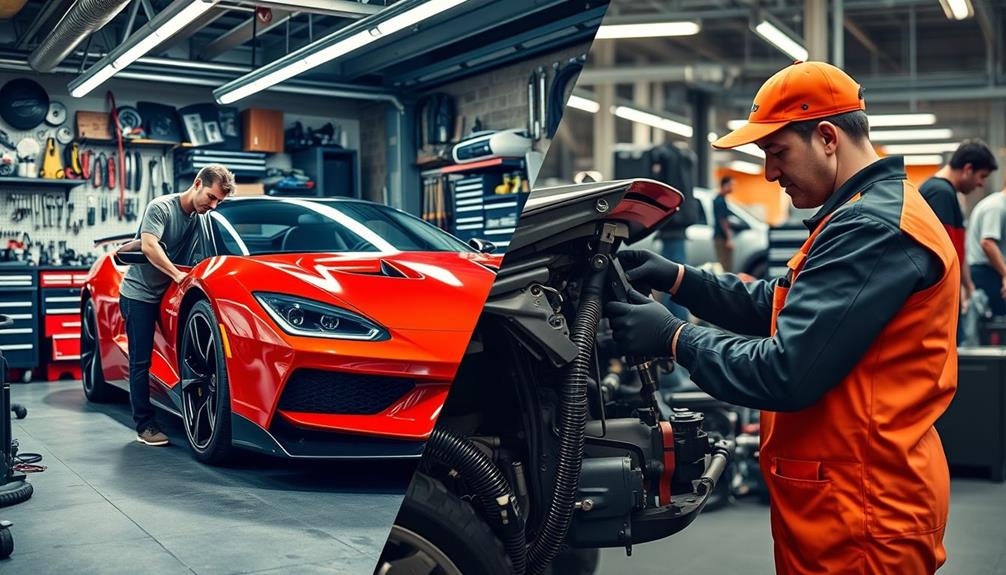
Many aspiring car tuners grapple with the dilemma of turning their passion into a profession. While it's tempting to follow the mantra, "Do what you love, and you'll never work a day in your life," the reality can be different.
You'll need to balance your enthusiasm for the automotive world with the demands of running a business and providing customer service. Understanding market trends, like the shift from internal combustion engines to electric vehicles, is essential for making informed decisions about your career, much like how investors rely on transparent fee structure for their financial planning. This knowledge can help you navigate challenges and identify opportunities.
Transitioning gradually from hobbyist to professional can keep your passion alive while you learn essential skills. By taking your time, you reduce the risk of burnout or disillusionment. Engaging with industry veterans, attending workshops, and joining local tuning clubs can also provide valuable insights and mentorship.
Ultimately, while your passion fuels your journey, treating it with the seriousness of a profession will help you thrive in this competitive field. Striking the right balance between passion and profession is key to achieving long-term success in car tuning.
Learning From Industry Experts
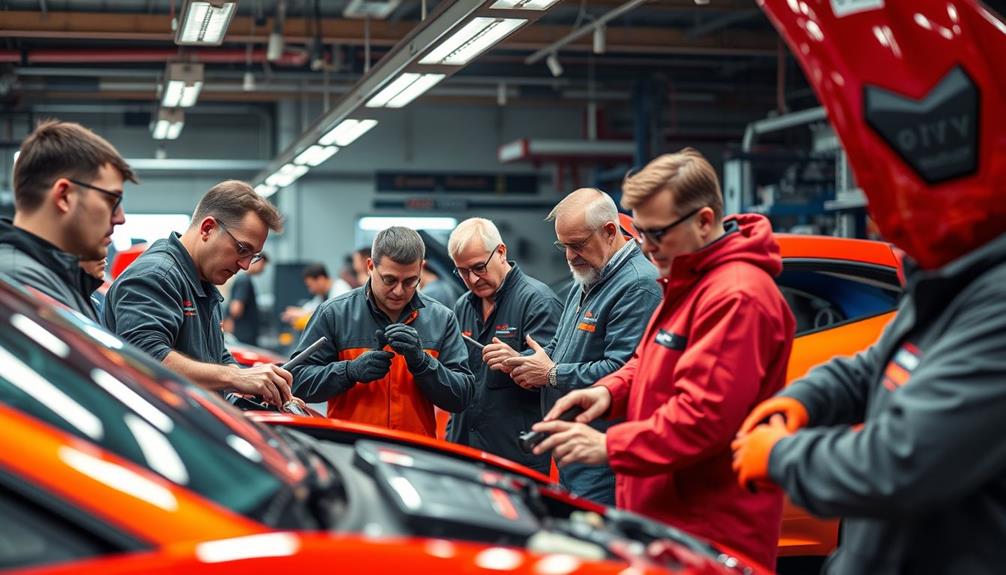
Engaging with industry experts can profoundly elevate your car tuning skills and knowledge. Their years of experience provide insights into the tuning process that you won't find in textbooks.
By seeking mentorship from seasoned professionals, you'll accelerate your skill development and deepen your understanding of car tuning.
Consider these key benefits of learning from industry experts:
- Practical Knowledge: Workshops and webinars hosted by tuning experts offer hands-on experience and keep you updated on current trends and technologies.
- Networking: Attending local events allows you to connect with experienced tuners, paving the way for opportunities in hands-on training.
- Avoiding Pitfalls: Industry veterans often share common mistakes to steer clear of, helping you navigate the complexities of tuning without incurring costly errors.
Educational Resources Available
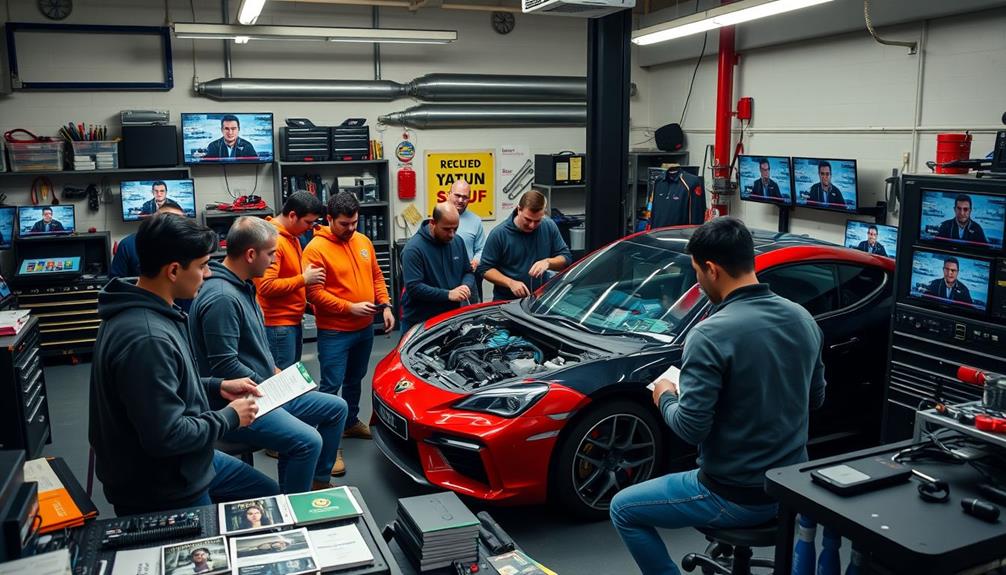
When exploring the world of car tuning, you'll find a wealth of educational resources tailored to help both beginners and seasoned tuners. Over 30,000 individuals have honed their skills through extensive courses that focus on mastering core principles of automotive tuning.
If you're just starting, take advantage of exclusive FREE content like foundational lessons on EFI tuning—no financial commitment needed!
Many courses offer video lessons that provide thorough knowledge at your own pace, ensuring you get a solid understanding of the material.
Plus, you can participate in live webinars to engage with experts and ask questions in real time, enhancing your learning experience.
To further support your journey, many educational resources come with a refund policy, allowing you to explore the content risk-free. This flexibility encourages you to engage without hesitation.
Hands-on experience is essential for success in a career in the automotive industry, and these resources emphasize continuous learning through practical application.
Community Engagement and Support

Building on your education in car tuning, community engagement can greatly enhance your journey. Engaging with local tuning clubs offers invaluable support and resources, fostering a sense of belonging among fellow enthusiasts.
By participating in events and meets, you'll gain visibility and networking opportunities that connect you with experienced tuners and potential clients.
Here are some ways to boost your community engagement:
- Join local tuning clubs: These communities provide a wealth of shared knowledge and resources.
- Attend workshops: Many tuning shops offer hands-on training sessions that can deepen your understanding of the industry.
- Collaborate on projects: Working with other tuners can lead to mentorship opportunities and skill development.
Online forums and social media groups are also fantastic platforms for discussion and technical support.
Frequently Asked Questions
Do Car Tuners Make Good Money?
Yes, car tuners can make good money, earning between $40,000 and $100,000 annually. By specializing in high-performance modifications and networking in automotive communities, you can greatly increase your visibility and client base for higher earnings.
Is Car Tuning a Hobby?
Did you know that over 60% of car enthusiasts consider tuning their primary hobby? Car tuning's a thrilling pursuit, where you modify vehicles for performance and aesthetics, connecting with fellow enthusiasts and showcasing your creativity.
What Do You Call Someone Who Tunes Cars?
You'd call someone who tunes cars an automotive tuner or simply a tuner. They specialize in enhancing vehicle performance through modifications, leveraging their understanding of engine dynamics, fuel management, and electronic control systems for peak results.
What Degree Do You Need to Tune Cars?
Did you know that 80% of successful car tuners have some formal training? While a specific degree isn't mandatory, a background in automotive technology or mechanical engineering will boost your skills and knowledge considerably.
Conclusion
In summary, turning your passion for car tuning into a profession can be incredibly rewarding. Did you know that nearly 40% of car enthusiasts consider making their hobby a full-time job? By honing your technical skills, networking, and steering through entrepreneurial challenges, you can transform your love for cars into a sustainable career. Remember, it's not just about the passion; it's about the dedication and effort you put in. So, why not take the leap and start your journey today?



